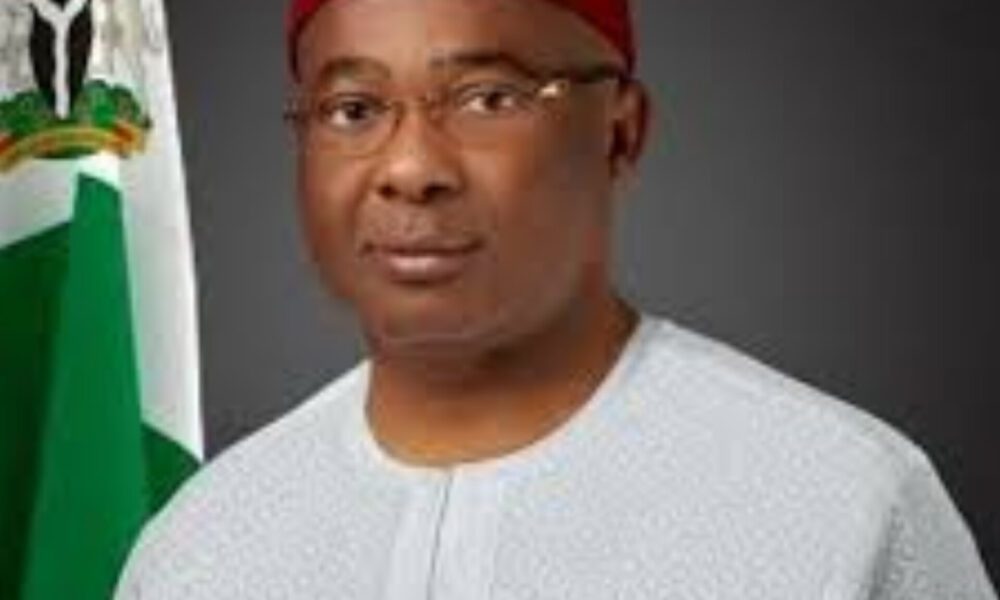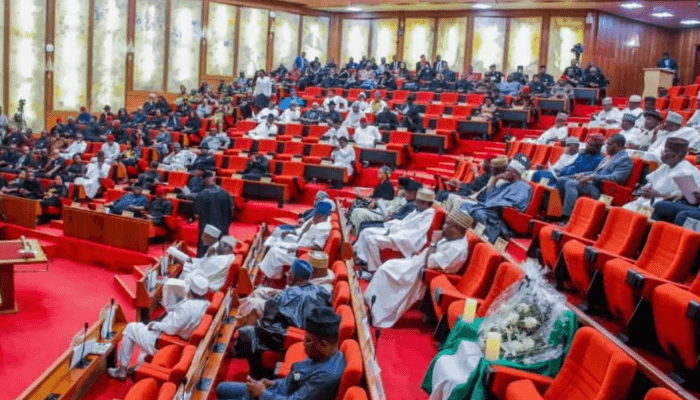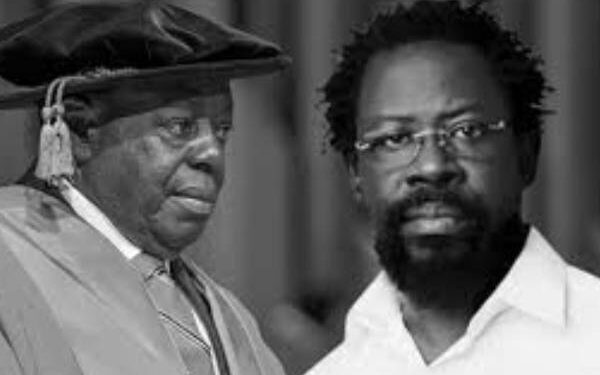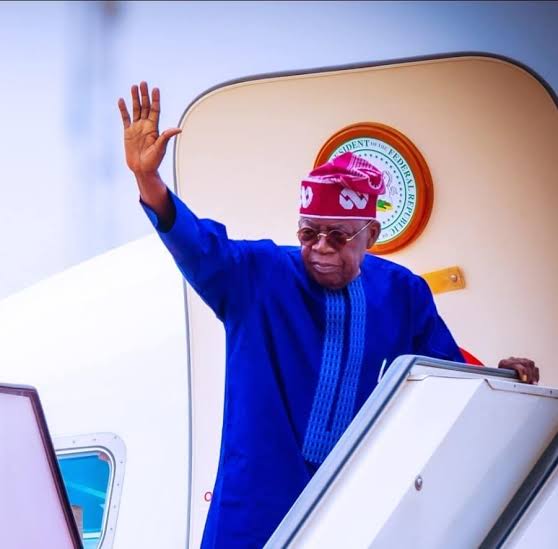By Ehichioya Ezomon
The cantankerous and chaotic primary election of the All Progressives Congress (APC) in Edo State may’ve come to an end, but the seed of confusion, division and alienation created in the initial balloting on February 17, lingers, thanks to the handiwork of the previous chairman of the APC Edo Governorship Primary Election Committee, Governor Hope Uzodimma of Imo State.
Concluding the primary that lasted seven days – from February 17 to 23 – Cross River State Governor Bassey Otu – who replaced Uzodimma on February 21 as chairman of the primary committee – declared Senator Monday Okpebholo (APC, Edo Central) as winner of the election, having polled 12,433 votes – fairly consistent with the votes (12,145) he’d received on February 17 when the Chief Returning Officer of the primary, Dr Stanley Ugboajah, declared him the winner of the poll.
Declaring the results on Friday, Sen. Otu said 41,784 votes were cast in the primary, with 31,863 accredited voters, total votes cast at 31,863, valid votes 31,863 and zero invalid votes in the race that featured 12 contestants.
The scores by the aspirants are as follows: Blessing Agbomhere, 731 votes; Charles Airhiavbere, 1,181; Osagie Ize-Iyamu, 378; Monday Okpebholo, 12,433; Dennis Idahosa, 6,541; Clem Agba, 2,732; Lucky Imasuen, 493; David Imuse, 423; Oserheimen Osunbor, 634; Gideon Ikhine, 728; Anamero Dekeri, 2,566; and Ernest Umakhihe, 2,117 votes.
Sen. Otu, who’d served as deputy chairman under the Sen. Uzodimma primary committee, said that, “Sen. Okpebholo, having satisfied all the requirements of the party, and scoring the highest number of votes in this Edo State governorship primary election, is hereby declared the winner,” and urged other aspirants and leaders of the party to put the primary behind them and prepare for the September 21 election.
But as first reported by VANGUARD, one of the aspirants, Hon. Dekeri (APC, Etsako Federal Constituency), signalled that the dust raised at the primary haven’t settled, protesting the outcome as “manipulated.”
He told journalists that, “I mobilised 65,000 people for this primary. In my election to the House of Representatives, I scored over 100,000 (votes), and then in this primary election, they said I scored about 2,000 (2,566) votes. This is a charade, as far as I am concerned,” and vowed to decide his next line of action.
Note that Dekeri, claiming to’ve “mobilised 65,000 people” indicates he possibly engaged in “vote-buying” of APC’s members, whereas the NWC-verified number of financial members cleared to vote at the primary stood a little above 44,000 – about 21,000 less than the figure Dekeri bandied to mobilise for the primary!
The disputed primary “over,” Mr Uzodimma will share in the blame – should the APC taste another defeat in four years at the September 21 governorship poll – for displaying bias, and attempting to throw the ticket for the “anointed candidate” of Senator and former Governor Adams Oshiomhole.
From what Nigerians glean from the media, not many people from the South East, and especially Imo State, will “pour drink on the ground” for prayer for Uzodimma. They know his journey to the government seat of power at Douglas House in Owerri, capital city of Imo State, and are quick to point to the circumstances in which he claimed the seat via the courts.
The APC had recognised the primary held in October 2018 that produced Uzodimma, and forwarded his name as the party candidate. That left in the lurch former Governor Rochas Okorocha’s son-in-law, Mr Uche Nwosu – who won in a parallel primary – prompting him to decamp to Action Alliance (AA) for the March 9, 2019, governorship poll.
At the election, Uzodimma placed fourth behind former Reps Deputy Speaker Emeka Ihedioha (PDP), who scored 273,404 votes; Mr Nwosu (AA), 190,364; former Sen. Ararume (All Progressives Grand Alliance (APGA)), 114,676; and Uzodimma (APC), 96,458 votes, with Mr Ihedioha declared elected and sworn-in as governor.
But Uzodinma claimed he’s shortchanged, as his scores in about 388 polling units weren’t recorded for him. From the Election Petitions Tribunal through the Appeal Court to the Supreme Court, Uzodimma showed how “he won” in each of the polling units in contention, in accordance with the laws guiding elections in Nigeria.
Convinced, the Supreme Court held on January 14, 2020, that results from 388 polling units “were wrongly excluded from scores ascribed to them (Uzodimma and APC),” and “the first appellant (Uzodimma) holds the majority of lawful votes cast.” The court affirmed him as elected, and duly returned Governor of Imo State, which position he’s sworn into on January 15, 2020.
Recall that a few weeks earlier, the Spiritual Leader of Adoration Ministry in Enugu, Rev. Father Ejike Mbaka, predicted the sacking of Ihedioha, and enthronement of Uzodimma as governor.
Fr Mbaka’s words, as first reported by The Cable: “In Imo state, there is hope. Hope, hope, hope in Imo state! A new leadership that will break barriers and there would be joy in the land of Imo. Lift your candles as I bless Hope Uzodimma; and I empower him to, spiritually, to take over. How, I do not know.”
So, many derisively refer to Uzodimma as “the Supreme Court Governor,” who they hoped would be a “one-term governor” to be booted out from office by “the good people of Imo State.” But dreams aren’t horses for beggars to ride!
Imolites failed to remove Uzodimma from office during his re-election bid on November 11, 2023, retaining his seat in a landslide, thanks in part to the antics of the president of Nigeria Labour Congress (NLC), Comrade Joe Ajero, who, barely weeks to the election, “imposed an economic blockade” on Imo, including air, water and land transportation.
The Ajero action – under the guise of fighting for Imo workers’ rights, who also suffered the effects of the blockade that’s seen as politically-motivated ahead of the governorship election – engendered sympathy of Imo voters for Uzodimma, who won handily without recourse to “polling unit mathematics,” as it’s in 2019 that critics say didn’t add up even at the Supreme Court.
Meanwhile, Uzodimma’s risen in the rank of the APC to becoming the Chairman of the Progressives Governors Forum (PGF) – an enviable position of trust he should ordinarily carry with aplomb and dignity in the discharge of assignments, like the supervision of the APC direct primary in Edo State, to choose a candidate for the governorship election.
In the lead-up to February 17, the National Working Committee (NWC) named Uzodimma to head the seven-man APC Edo primary committee, charged with conducting a credible, transparent and an acceptable election.
At the inauguration of both the primary and appeals committees on February 15 at the national headquarters of the APC in Abuja, Uzodimma presented himself as a democrat, who wanted things done, as laid down in the rulebook of the party.
Specifically on the appeals committee, the APC national chairman and former Kano State Governor Abdullahi Ganduje, who vows to reclaim Edo State from the opposition Peoples Democratic Party (PDP), said: “It is a tradition for us to always constitute a body that will undertake an assignment so that at the end of it, we get good results… Whatever you do, the contestants are free to appeal. That is why we have an appeals committee, which is like the Supreme Court.”
Responding, Uzodimma thanked Ganduje and the NWC for the confidence reposed in the members, and promised to discharge their assignment with utmost diligence. “Our prayer is that we work hard to justify this confidence reposed in us,” Uzodimma said, adding, “It behooves on members of our committee to work in harmony with the party’s local leadership in Edo, to bring up a product that will look like our party and is easily marketable in Edo.”
Did Uzodimma carry out the duty of producing a sellable, marketable and acceptable candidate in accordance with the dictates of the constitution of the APC? No! Rather, he allegedly connived with the local potentate, Comrade Oshiomhole, and announced as “winner” of the primary Hon. Idahosa (APC, Ovia Federal Constituency), who’s Oshiomhole’s “anointed candidate” for the governorship.
Bedlam followed Uzodimma’s declaration, and three others in tow, such that President Bola Tinubu – just back in the country from an African Union (AU) meeting in Addis Ababa, Ethiopia – was called upon by APC stakeholders in Edo State to intervene in the impasse, to save the party from another defeat in four years in the state.
Tinubu, who reportedly expressed displeasure over the turn of events, directed the NWC to quickly resolve the stalemate before the February 24 deadline set by the Independent National Electoral Commission (INEC).
And pronto, Ganduje – also complicit by congratulating the Uzodimma-declared “winner” – summoned an emergency meeting of the NWC at night, declared the Edo primary “inconclusive,” and replaced Uzodimma with Cross River Governor Otu, to conclude the week-long exercise.
Polity watchers wonder why the APC didn’t also replace Sen. Otu for the repeat primary? Probably for the fact that it’s the governor, who debunked the Oshiomhole alleged Tinubu “endorsement” of the candidacy of Idahosa, reportedly in a trending video 24 hours to the February 17 primary.
As first reported by THISDAY, Mr Otu “categorically dismissed the rumour that President Tinubu has anointed a particular aspirant for the Edo APC gubernatorial primaries,” and “urged party faithful to disregard the lie and vote for their choice candidate.”
Besides, Otu could’ve disagreed with Uzodimma’s hurried declaration of Idahosa as the “winner” of the primary, even when only eight local government areas’ results had been collated, and Okpebholo, and not Idahosa, was leading comfortably.
It’s at that point of Uzodimma’s declaration, and subsequent others, that the Ganduje-led NWC should’ve taken a decisive action to halt or cancel the primary. As I noted in my copy on Wednesday, February 21, entitled, “Edo 2024: Can Tinubu bell the ‘cats’ in APC’s primary fiasco,” Ganduje and his team “didn’t have to await Tinubu’s directive on what to do to rectify the controversial primaries.”
“In a best case scenario, the APC leadership would’ve acted swiftly, called for calm, and given the assurance to members, particularly in Edo State, that it’d look into the primary misadventure through the primary appeals committee instituted ahead of the exercise.
“And in a worst case scenario, the party would’ve dismissed the conflicting declarations made – with four aspirants laying claim to winning the primaries – dissolved the Governor Hope Uzodimma-led primary election committee, and fixed a new date for a re-run or fresh primary poll within days, to meet the February 24 deadline set by the Independent National Electoral Commission (INEC).
“But what did Nigerians – particularly the shocked and distrust members of the APC in Edo State – see and hear from the leadership of the party? A congratulatory message in the night of February 17 from the national chairman, Ganduje, “to the winner of the primaries,” and solicitation for the “defeated aspirants” to “bury the hatchet” and work for party unity to win the Edo governorship.
“As of Sunday, February 18, four aspirants claimed that they won the primaries…. to choose a candidate for the September 21 election. They included Hon. Idahosa, Sen. Okpebholo, Hon. Dekeri, and Mr Agba, former minister of state for Budget and National Planning.”
In the end, Uzodimma faced a humiliating “sack” from the primary committee, for allegedly doing Oshiomhole’s bidding to “anoint” Idahosa for governor – perhaps to ingratiate Oshiomhole, who’s APC’s national chairman when he vied for Imo governor in 2019.
Belatedly on February 22, the APC leadership clarified that Uzodimma wasn’t “sacked” nor “dropped” from the pimary committee, but was unavailable to lead the completion of the primary “due to his prior scheduled attendance of, and presentation of a report, to the National Economic Council meeting today, February 22, 2024,” reports the online portal, GWG.NG, quoting the APC national publicity secretary, Mr Felix Morka.
“As a result, His Excellency Bassey Otu, Governor of Cross River State, who was the Deputy Chairman of the Committee, graciously accepted to serve as Chairman, and to complete the Edo State Gubernatorial Primary Election Process,” Morka added.
That’s mercy after death, which left Uzodinma alone to carry the can of the botched February 17 primary, with the hierarchy of the NWC going scot-free! Hopefully, Uzodimma would’ve learned, the hard way, some lessons in serving with diligence, the broader, rather than the narrow interest, in discharging future assignments!
Mr Ezomon, Journalist and Media Consultant, writes from Lagos, Nigeria





